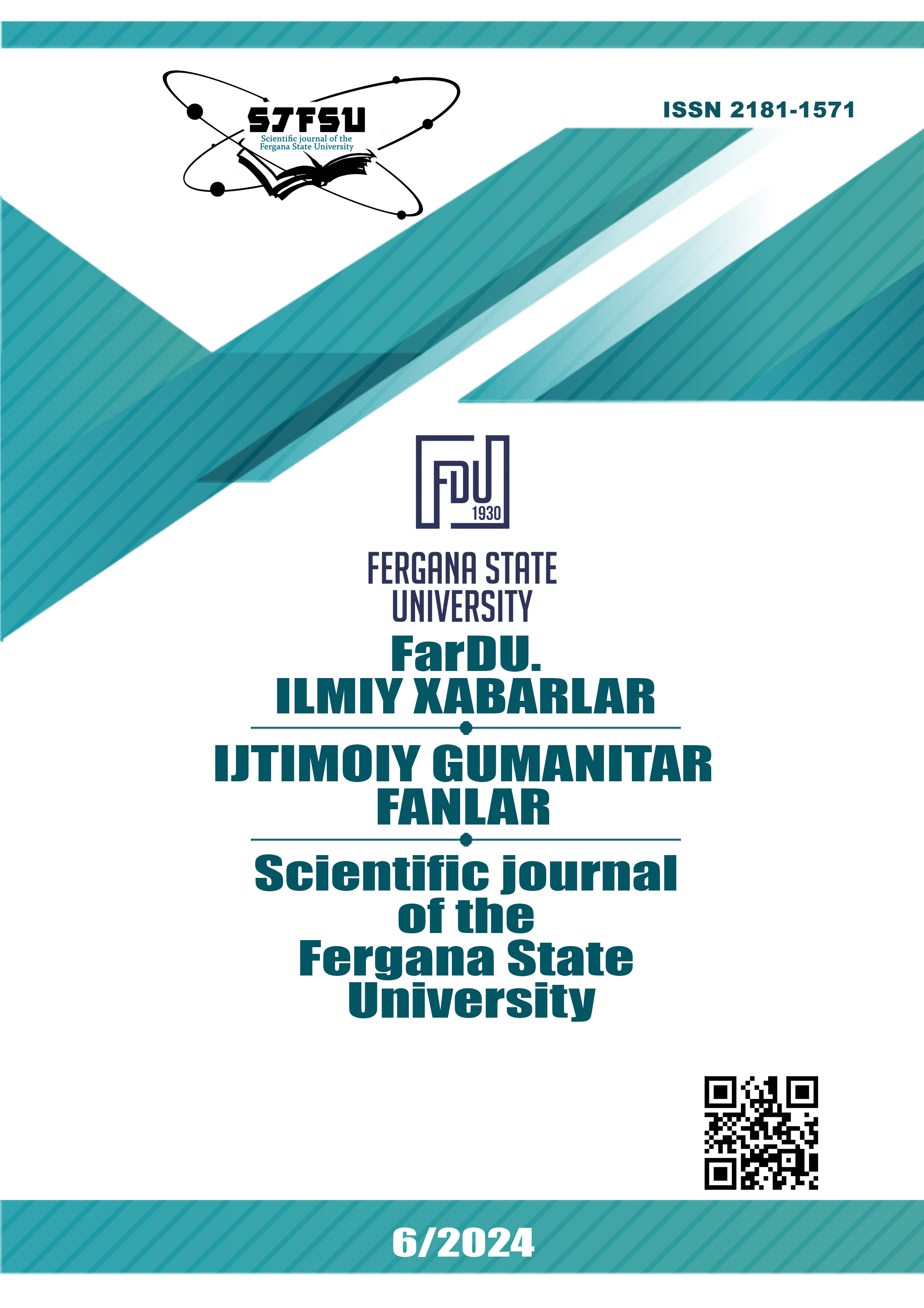A COMPARATIVE ANALYSIS OF SPELLONYMS IN CONTEMPORARY ENGLISH AND UZBEK LITERATURE
Keywords:
Key words: Magical objects, folklore, bravery and magic, magical prowess, heroic deeds, cultural heritage, witches and prophecies.Abstract
In contemporary English literature, spellonyms often appear in fantasy and magical realism genres. Examples include: "Wizard" a person with magical knowledge and powers. Example: "Gandalf" and "Dumbledore" from J.K. Rowling’s Harry Potter series. "Enchantment" is magic or spells performed by practitioners. Example: Magical objects in C.S. Lewis’s Narnia series. "Charm" is a magical object or phrase, often used for beneficial purposes. Example: Magical items in Neil Gaiman’s American Gods. Vladimir Propp’s the Morphology of the Folktale (1968) is a seminal work in folklore studies that primarily analyzes the structure and function of folktales. While Propp's focus is on the narrative structure of folktales, his framework can be useful for understanding spellonyms and mythological elements in literature. Here’s how Propp’s work relates to spellonyms and myth. Propp’s functions often involve magical objects or actions. Spellonyms could be related to these elements, serving as names or terms that signify the power or purpose of magical items. Spellonyms might play a role in the transformation of characters or the resolution of conflicts, which are key functions in Propp’s model.In contemporary Uzbek literature, spellonyms—terms or names associated with magic or supernatural elements—are frequently used in both folk tales and modern fantasy works to evoke cultural heritage and create imaginative worlds. These terms often draw on traditional Uzbek folklore, mythology, and religious beliefs. Alpomish" is based on the legendary hero of Uzbek folklore, Alpomish is often depicted with magical prowess and heroic deeds. Modern works may reference Alpomish or similar legendary figures in fantasy contexts to highlight themes of bravery and magic. Spellonyms in English literature often reflect historical and cultural values. For example, beliefs about magic and witches from medieval and Renaissance Europe shape modern literature. English literature features spellonyms influenced by medieval folklore and literary traditions. For example, Shakespeare’s Macbeth includes magical elements like witches and prophecies.
References
Gaiman, Neil, and P. Craig Russell. American Gods: The Moment of the Storm #9. Dark Horse Comics (Single Issues), 22 Jan. 2020. Bet 34
“Oxford Companion to Fairy Tales.” Oxford University Press., vol. 677, no. 6778. Bet 65
Propp, V. (1968). The Morphology of the Folktale. University of Texas
Dudarov, Mikhail. Dudarov, Mikhail. Www.researchgate.net/Publication/26490771_Genre_Space_of_Folk_Narrative_Tradition_The_Russian_Case bet 76
Morphology of the Folktale. Translated by Laurence Scott, University of Texas Press, 1968. Bet 87
Inoyat, Afzalov. “ЭЛЕКТРОННАЯ БИБЛИОТЕКА ПРИКЛАДНЫХ РАДИОЭКОЛОГИЧЕСКИХ МОДЕЛЕЙ.” ИНФОРМАЦИОННЫЕ ТЕХНОЛОГИИ И
ВЫЧИСЛИТЕЛЬНЫЕ СИСТЕМЫ, no. 6778, 21 Mar. 2024, https://doi.org/10.14357/20718632240104. Accessed 19 Sept. 2024.
O‘zbekiston Milliy ensiklopediyasi. M harfi. T.: “O‘zbekiston milliy ensiklopediyasi” Davlat nashriyoti, 2008.– bet. 648. http://www.hrono.ru/organ/idea/mif_scola.php
Downloads
Published
Issue
Section
License
Copyright (c) 2024 Scientific journal of the Fergana State University

This work is licensed under a Creative Commons Attribution-NonCommercial-NoDerivatives 4.0 International License.
How to Cite
Most read articles by the same author(s)
- , TRADITIONS OF CHILDREN’S FANTASY IN “THE CHRONICLES OF NARNIA” BY C. LEWIS , Scientific journal of the Fergana State University: No. 3 (2023): Scientific journal of the Fergana State University (Social humanities sciences)
- , , , LINGUISTIC ANALYSIS OF THE CONTENT OF THE CONCEPT "MAN" , Scientific journal of the Fergana State University: No. 2 (2023): Scientific journal of the Fergana State University (Exact and natural sciences)
- , , INGLIZ TILIDAGI FRAZALI FEʼLLARNING SEMANTIK TAHLILI , Scientific journal of the Fergana State University: No. 6- TOM (2023): SPECIAL ISSUE
- , ISSUES OF DEVELOPMENT OF ENVIRONMENTAL COMPETENCE OF STUDENTS BASED ON THE NATURAL-SCIENTIFIC VIEWS OF AL-FARGANI AND ABU RAYHAN BERUNI , Scientific journal of the Fergana State University: No. 1 (2024): Scientific journal of the Fergana State University (Social humanities sciences)
- , , STUDY OF HOLIDAY-RELATED LEXICAL UNITS IN UZBEK AND GERMAN LANGUAGES , Scientific journal of the Fergana State University: No. 2 (2024): Scientific journal of the Fergana State University (Social humanities sciences)
- , SEMANTIC ANALYSIS OF UZBEK AND ENGLISH FOLK PROVERBS ABOUT THE IMPACT OF CLEANLINESS ON THE HEALTH OF A PERSON , Scientific journal of the Fergana State University: No. 5 (2024): Scientific journal of the Fergana State University (Social humanities sciences)
- , ISSUES OF DEVELOPMENT OF ENVIRONMENTAL COMPETENCE OF STUDENTS BASED ON INTEGRATED EDUCATION , Scientific journal of the Fergana State University: No. 1 (2025): FarDU ilmiy xabarlari jurnali (PEDAGOGIKA)
- , , LINGUOCULTURAL ANALYSIS OF PROVERBS ABOUT FOOD, WHICH REFLECT THE INFLUENCE ON HUMAN HEALTH , Scientific journal of the Fergana State University: No. 4 (2023): Scientific journal of the Fergana State University (Exact and natural sciences)
- , SCIENTIFIC-PEDAGOGICAL POSSIBILITIES OF DEVELOPING ENVIRONMENTAL COMPETENCE OF STUDENTS BASED ON THE VIEWS OF JADID THINKERS , Scientific journal of the Fergana State University: No. 6 (2023): FarDU.Ilmiy xabarlar jurnali (Aniq va tabiiy fanlar)
- Xamidovich, Fazliddin qizi, Xasanovich, APIS MELLIFERA ASOSIDA OLINGAN XITOZAN DEATSETILLANISH DARAJASINI ANIQLASH , Scientific journal of the Fergana State University: No. 4 (2025): FarDU ilmiy xabarlari jurnali (Tabiiy fanlar)

